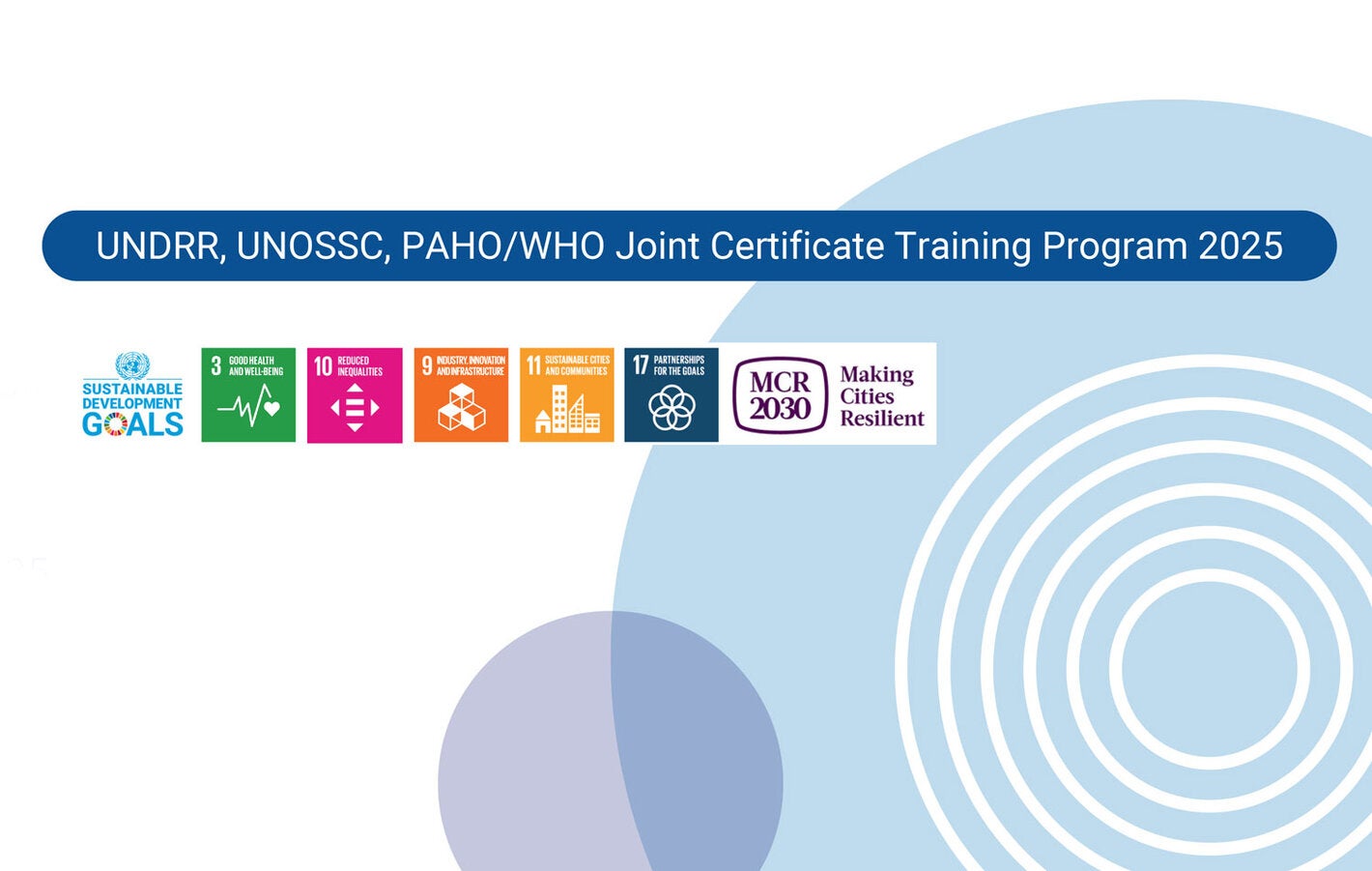
When:
Date: 12, 19, 26 March 2025 (Wednesdays)
(Three 120-minute online sessions and one post-course survey)
Time: 8:00 New York | 13:00 Geneva | 19:00 Bangkok | 21:00 Incheon
Workshop Language: English with simultaneous interpretation in Arabic, Chinese, French, Portuguese, Russian, Spanish and International Sign Language.
8:00 New York | 13:00 Geneva | 19:00 Bangkok | 21:00 Incheon (120 minutes)
For more information and registration
Course Objective:
This training serves as an introductory training for urban leaders, planners, and practitioners, aiming to:
- Increase awareness and understanding for managing complex urban disaster risks, health emergencies, and disaster risk management, leveraging technology, and facilitating South-South and Triangular Cooperation;
- Introduce useful concepts and tools to strengthen inclusion, especially the inclusion of persons with disabilities and older persons in urban disaster risk management;
- Better prepare city stakeholders and engage them in making cities resilient and inclusive for future crises, health and non-health emergencies and uncertainties;
- Facilitate learning through South-South and Triangular Cooperation and sharing of experience;
- Inspire and motivate whole-of-society to play a key and active role in securing resilient, inclusive and sustainable urban futures.
Targeted Audience
Local and national government officials in charge of disaster risk reduction and management, urban development and planning and public health emergency preparedness, national associations of municipalities, urban resilience and development practitioners, as well as civil society, private sector, and academia.
The course is open to all participants from both developed and developing countries. Participants from Least Developed Countries (LDCs) and Small Island Developing States (SIDs) are highly encouraged.
No. of Trainees: Maximum 1,000 participants can attend the live training sessions, on a first come first served basis.
Organizers:
The United Nations Office for Disaster Risk Reduction (UNDRR) Global Education and Training Institute (GETI) was established in 2010 to develop a new cadre of professionals in disaster risk reduction and climate change adaptation to build disaster resilient societies. GETI has a global mandate to provide capacity building support to mainstream disaster risk reduction and climate change adaptation into sustainable development; convene and support inter-city learning to strengthen resilience (Making Cities Resilient); and to provide capacity building and best practice sharing support to national training institutions working on resilience issues. Based in Incheon, the Republic of Korea, UNDRR GETI is also the global secretariat of the Making Cities Resilient 2030 (MCR2030).
The United Nations Office for South-South Cooperation (UNOSSC) was established to promote, coordinate and support South-South and triangular cooperation (SSTC) globally and within the United Nations system. UNOSSC initiated the "Global South-South Development Center Phase II” (2025-2030), with full funding support from the Government of China, which aims to facilitate practical SSTC initiatives globally in advancing the Sustainable Development Goals (SDGs).
Pan American Health Organization (PAHO/WHO) Health Emergencies Department works with countries of the American Region to increase the health sector resilience to emergencies and disasters. PAHO's priority is to deliver rapid, predictable, and comprehensive support to Member States in terms of prevention, risk reduction, preparedness, surveillance, response, and early recovery in case of any threat to human health, including outbreaks or disasters caused by natural phenomena, biological, chemical or radiological agent, human activities, conflicts or any other hazard. When national capacities are overwhelmed, PAHO is ready to lead and coordinate the international health response to contain disasters, including outbreaks, and to provide effective relief and recovery to affected populations.
